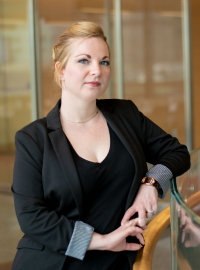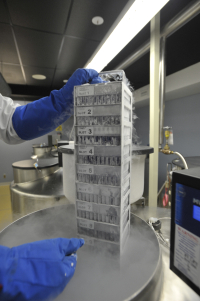The Ontario Health Study Newsletter, November 2018
Nov 19, 2018 // OHS Newsletter

In this issue:
- Video: What’s next for participants
- How do you work? Get ready to tell us
- OHS Q&A: How are my samples being used?
- What made you participate in the OHS?
- Has your contact info changed?
Kelly McDonald, OHS Program Manager, talks about what’s next for the Study.
How do you work? Get ready to tell us
What different types of jobs have you held over the years? Done shift work? How long is your commute?
OHS will be asking you these questions and more, in our next online questionnaire, available in spring, 2019.
The Work History questionnaire will be open to all 225,000 OHS study participants. The OHS team currently hard at, well, work, selecting those job-related questions most relevant to researchers who want to explore how what you experience in your work life may be linked to health changes or risks factors for cancer or chronic conditions. “How we work, where, when, and the types of tasks we do, is changing rapidly,” says Matthew Campbell, the OHS Research Associate compiling the Work History questionnaire. “Our work environments absolutely have an impact on our health, so this will generate really rich data for researchers.” Here’s a snapshot of what we could be asking of you in the 2019 OHS Work History questionnaire:
- All the jobs you’ve held, whether you’re currently employed, between jobs, or retired
- Working conditions; how physical was the work?
- The demands of the job, and the level of control you have over how much work you are given
- How a job impacted your mental, social and emotional well-being
- How satisfying the work was, and whether you felt supported in your role
- Exposures to chemicals or hazards on the job, and your use of protective equipment
- Your commute; how you got to work, and how long it took
We’ll be sharing more updates on the Work History online questionnaire. You can get ready now by ensuring we have your latest contact info.
| More research in progress Check out eight research projects currently underway that are using de-identified data provided, in part, by OHS participants. These are being undertaken as part of the Canadian Partnership for Tomorrow Project, the pan-Canadian research platform that provides data from five regional cohorts (including data from 165,000 OHS participants). |
OHS Q&A: How are my samples being used?
 If you are one of the many participants who so generously donated your time and a blood sample to this Study, you will have received and reviewed the results of the immediate analysis of your blood sample, which included a complete blood count and blood sugar analysis. However, that is only a small portion of your sample’s potential, since the majority of the five tubes collected are securely stored for future use by health researchers and scientists. Here to answer your questions about the Study’s 41,000 blood samples and nearly 13,000 urine samples is Melissa Moore, OHS Project Lead for Biospecimen Operations.
If you are one of the many participants who so generously donated your time and a blood sample to this Study, you will have received and reviewed the results of the immediate analysis of your blood sample, which included a complete blood count and blood sugar analysis. However, that is only a small portion of your sample’s potential, since the majority of the five tubes collected are securely stored for future use by health researchers and scientists. Here to answer your questions about the Study’s 41,000 blood samples and nearly 13,000 urine samples is Melissa Moore, OHS Project Lead for Biospecimen Operations.
Q. Where are my samples right now?
- Samples collected by the Study are stored at two secure, separate facilities in Ontario. One is our main “working” facility, and the other is our “mirror” or secondary facility. At the time of collection, each sample was divided equally. When it comes time for samples to be used for research, we start with those at our working facility. As those get used over time for various research projects, we will eventually begin providing samples from the secondary facility. To protect privacy, names are never given to researchers – every sample is assigned a unique code rather than having your name or other identifying information visible.
Q. The OHS will continue for a very long time – how are my samples stored?
 Biosamples, such as blood and urine, are frozen in liquid nitrogen vapour at a temperature of around -180°C or colder. Any DNA extracted from a blood sample is stored at -80°C or colder. Keeping samples at these temperatures can preserve them for research projects for a lifetime and beyond.
Biosamples, such as blood and urine, are frozen in liquid nitrogen vapour at a temperature of around -180°C or colder. Any DNA extracted from a blood sample is stored at -80°C or colder. Keeping samples at these temperatures can preserve them for research projects for a lifetime and beyond.
Q. How will my samples be used and what kinds of tests might be done with them?
- Samples will be used for research into biomarkers (indicators of disease), metabolites (small molecules in the blood, such as amino acids, sugars or fats), environmental or toxic substance exposures and more. Additionally, your DNA may be used for genetic and genomic research. Unsure of the difference? As technology advances over time, additional as-yet-undiscovered tests may be performed as well. Again, your privacy is protected by de-identifying your sample before it ever reaches a researcher.
Q. What are researchers using my samples to investigate?
- Biosamples are extremely useful to researchers interested in many different aspects of our health. At the moment, researchers are using samples as part of early cancer detection programs and studies investigating the early evolution of tumours. Studies like the Canadian Urban Environmental Health Research Consortium (CANUE) are using OHS data and biosamples to examine links between environmental exposures and the aging process. Other researchers, including our own Executive Scientific Director Dr. Philip Awadalla, are exploring the role our genes and environment play in the development of “metabolic syndrome,” a cluster of conditions including high blood pressure, obesity, high blood sugar and more which, combined, greatly increase the risk of developing cancer and chronic diseases like diabetes, heart disease, and stroke.
Q. How many times can my samples be used in the future? Will you ever “run out”?
- Prior to freezing, blood samples were divided into 20 smaller tubes called “aliquots”. The aliquots themselves can be used to perform multiple tests. This means that each participant’s sample can potentially be used many times to answer a broad range of research questions. Additionally, a portion of all biosamples are saved as “legacy” samples. If a breakthrough scientific discovery is made, we want to have these original reserve samples available to further investigate that discovery.
What made you participate in the OHS?
We love hearing what made you join the Ontario Health Study. Here’s what John from Toronto had to say:
| “My twin girls were born in Hamilton, ON in 1982 ... 11 weeks premature. Both hovered around a birth weight of 2.5 lbs. They were given a 50% chance of survival at that time, and out of that 50% they may be left with a permanent disability. We were asked by McMaster Medical Centre if we would allow our girls to participate in a research study, to which we agreed. Why? At that point, they had both survived and a great deal of this was due to others before us who had agreed to participate in research. This resulted in improved treatments, methods, training and ultimately the survival of our “preemies”. Today one is a medical doctor and the other an environmental chemist. We’ve often said to others that it wasn’t luck but rather we were fortunate to have benefited from those before us who supported science-based research. Keep up the good work!!” |
Want to share your reason for joining the OHS? We’d love to hear it. Email us at communications@ontariohealthstudy.ca with the subject line “OHS Feedback”.
Has your contact info changed?
Stay connected! Has your email, home address or phone number changed? Let us know so we can send you follow-up questionnaires, invitations to other studies, and share our latest news. Even if you have moved outside of Ontario or Canada, you’re still an active participant! Staying in touch with participants is important for the Study’s success; without your involvement there would be no OHS. Your participation in the Study contributes valuable information to support cancer and chronic disease research. Many of our 225,000+ participants move each year, and it’s a challenge to ensure we have the latest contact info for each of you. OHS will work with Canada Post’s National Change of Address Mover Data service to ensure we have your latest mailing address. If you have consented to future contact by the OHS team, and we have a new mailing address for you, we’ll be in contact to confirm that we are using your most recent address. A few of you may have received a phone call noting that your date of birth is missing on your account. If that’s you, please add the date of birth to your account, as researchers need to factor age alongside various health conditions.
Ways to update your contact details:
- Log into your OHS account:
- Log in to your account.
- Click “My Profile,” then click “Personal Information”.
- Make any necessary changes and click “Apply” at the bottom of the page.
- By Email: Send your new contact information to info@ontariohealthstudy.ca
- By Phone: Call us at 1-866-606-0686, weekdays 9 am to 5 pm.
